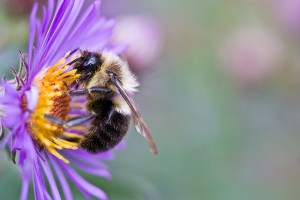Bees prefer neonicotinoid-laced food
A new study published in the scientific journal Nature suggests that bees may be addicted to neonicotinoid pollen. Researchers offered honey bees and bumblebees food with concentrations of imidacloprid, thiamethoxam, and clothianidin—the three most commonly used neonicotinoids—as well as insecticide- free food. Bees consistently chose to consume food containing imidacloprid or thiamethoxam over the insecticide-free food. Further analysis indicated that bees could not taste the neonicotinoids in the laced food, suggesting that similar to the addictive affects of nicotine, neonicotinoids may drive bees to consume more of the pesticide-contaminated food than they normally would. If foraging bees “prefer to collect nectar containing imidacloprid and thiamethoxam, they will also bring more neonicotinoid-laced food back to the colony. For these reasons, whole colonies could be exposed to higher levels of these pesticides in the field than had been predicted previously. Thus, mitigation strategies that rely on planting alternative sources of nectar and pollen might not be enough to decrease the risk of poisoning pollinators with pesticides. Instead, long-term changes to policy that include reducing their use may be the only certain means of halting pollinator population decline,” scientists wrote.




